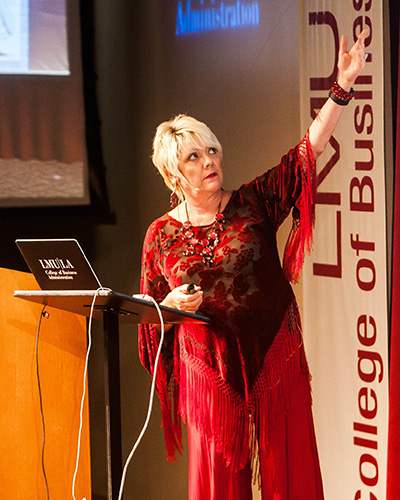
Ruth McCartney, CEO of McCartney Multimedia and stepsister to the famous Beatle, spoke as part of the Paul A. Grosch Lecture Series on Wednesday, October 19, 2016.
Big Data is having a big moment. More than 90% of the data in the world was created in just the last two years. It’s cutting billions in energy costs, decoding DNA to find cures and anticipating hurricanes. Big Data predicted the Zika virus and the Ebola outbreak. It even predicted the winner of the 2012 presidential election.
With the power of massive data sets and advanced analytics, experts say that companies with savvy finance departments will better anticipate customer and supplier demand, predict sales and profits under hundreds of different scenarios, detect fraud and drastically cut the time it takes to close the books at the end of each quarter. Not surprisingly, accounting and finance graduates with data analytics expertise are in high demand.
“There is a new generation of accountants coming up who can be impactful in making sense of all this data that’s being collected,” said Ruth.
Ruth was introduced to data as a young girl in the mid-1960s when the Beatles were first becoming popular. She was essentially managing all of their fan mail by collecting names, addresses, cities and states as a way to keep in touch with them. She remembers John Lennon used to call them “customers” instead of fans.
The origins of data started out in churches. Then came analog data (birth/marriage/death records, census data, visitor guest books) followed by online forms and accounts. Big Data, or unstructured data, was introduced with social media with its likes, dislikes, comments, shares, etc. New (even bigger) data such as mobile and real time data GPS, weather, QR code scans, mapping, package tracking and traffic add to the challenge of analytics.
Ruth shared numerous examples of how Big Data is impacting our everyday lives through the use of retail rewards cards, online purchases, airline loyalty programs, store foot traffic and food consumption patterns.
Every click, share, check in, email, blog post, SMS, MMS, phone call, music download, Netflix stream, e-commerce transaction, web search, Skype call, FitBit run and iChat creates a blip on the Big Data radar that is being recorded and analyzed by someone, somewhere. By 2020, digital knowledge is expected to equal 44 zettabytes, up from 4.4 zettabytes today. One zettabyte equals two billion minutes of music. And 99.5% of this digital information hasn’t even been looked at.
“Because accountants and finance professionals are trained to gather, analyze and benchmark data, students today are in a unique position to be able to provide a new and critical service to employers: making Big Data smaller and distilling vast amounts of information into actionable insights,” said Ruth. “Big Data is here to stay and will create jobs and place more power in the hands of the financial community.”



